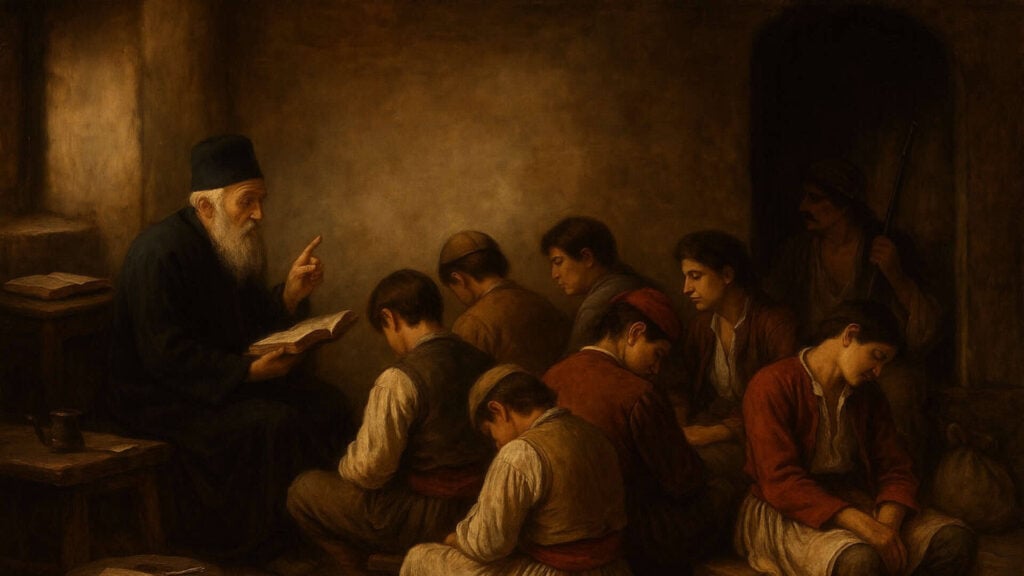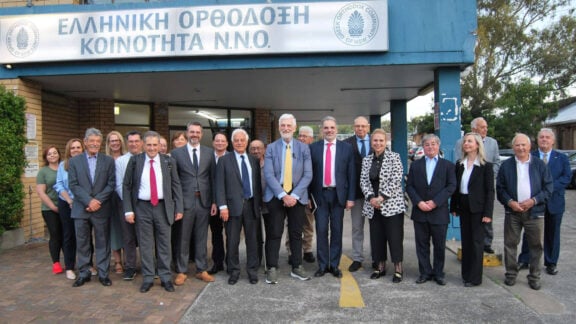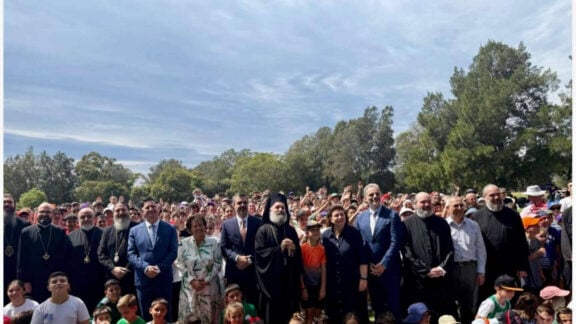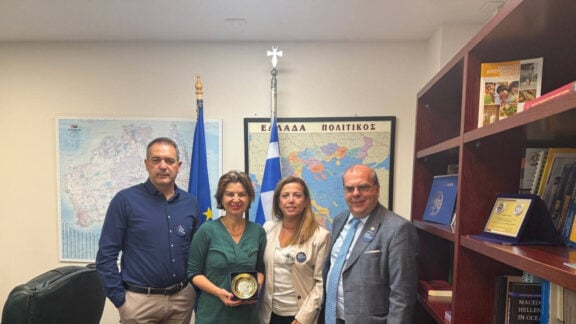In diasporic Greek communities across the globe, and particularly in Australia, the existence of Greek language schools is often heralded as a cultural triumph. We commemorate anniversaries, issue proclamations of pride, and publicly commend ourselves for maintaining institutions whose presence is treated as evidence of success. On Greek National Day, we line the streets with students in traditional costume, parading them before cameras and community dignitaries as though they were living ornaments. We feature them in promotional videos, in school calendars, and at commemorative events, standing in formation, mouthing slogans they scarcely understand. These children are summoned to perform Hellenism like gargoyles adorning a building whose inner structure is crumbling. Yet, behind this façade of celebration lies a reality that is deeply troubling. We are failing to produce speakers of the Greek language.
Greek, once the vital bridge between generations, increasingly functions as a ceremonial relic rather than a living, dynamic form of communication. The essential question is not how many schools we have, but whether those schools are achieving their core purpose.
Beyond the State-imposed curriculum for the VCE and the Certificate of Attainment in Greek, which is relevant solely for the purposes of the Greek state, and despite the existence of the Common European Framework of Reference for Languages, there is being applied consistent or comprehensive mechanism for evaluating the quality of instruction in our Greek language schools across the board There is no unified national curriculum framework, no independently accredited system for measuring student proficiency, and no formal assessment of whether language schools are meeting meaningful benchmarks in reading, writing, listening, or speaking. Nevertheless, we continue to cite the number of operational programs, campuses, or enrolments as though they were valid indicators of success.
In Victoria, the situation is particularly acute. Enrolments in Greek language programs have reached their lowest recorded levels, a trend confirmed by annual reports from educational bodies and census data. According to figures from the Modern Greek Teachers’ Association of Victoria, participation in formal Greek language education has declined steadily over the last two decades. Some programs have diminished to the point of being nominal. Yet the more revealing reality is that even where enrolments remain nominally healthy, the linguistic outcomes remain dismally low.
It is increasingly common to encounter students who, after many years of language schooling, are unable to hold a basic conversation in Greek. They may be able to recite prayers or sing patriotic songs, but they cannot compose a coherent sentence or read a paragraph without assistance. In terms of applied linguistics, these students are failing to reach functional literacy: a threshold level of competence required to use the language in everyday contexts. The institutions that produce such outcomes are not fulfilling their educational mandate.
The Greek language is more than a means of communication. It is widely regarded, both in scholarly discourse and community consciousness, as an essential component of Greek identity. The formation of the modern Greek state relied heavily on the symbolic power of a linguistic tradition that stretched from Homer through the Byzantines to the vernacular of the people. In the diaspora, language has served not merely as a tool of heritage but as a living symbol of continuity with the homeland.
Benedict Anderson’s theory of “imagined communities” offers a valuable lens for understanding this dynamic. National and ethnic identity is not merely inherited but constructed through ritual, narrative, and language. In diaspora, where assimilation pressures are constant, language becomes the most tangible link to historical imagination. Once lost, the imagined community loses coherence.
Sociolinguist Joshua Fishman supports this view. In his work on reversing language shift, he contends that heritage language loss is often the first step toward cultural assimilation. When intergenerational transmission ceases, a community forfeits its strongest means of preserving distinctiveness. In multicultural societies like Australia, where English dominates all spheres, language shift is not abstract. It is the very process by which communities are absorbed, leaving only symbolic traces behind.
If language is, as Percy Shelley suggested, the soul of a people, then what are we to make of a system of our own making, that leaves our children unable to speak with their grandparents, read the liturgy of their Church, or understand the stories of their ancestors, let alone use it as a viable medium of communication amongst their peers?
Where communal investment is concerned, it is not enough to rely on sentiment. We must turn to reasoned analysis. One of the most basic tools of policy evaluation is cost-benefit analysis. What returns are we, as an ethno-linguistic community, receiving for the time, money, and energy being expended on Greek language education?
Substantial resources are poured each year into the maintenance of Greek language schools in Australia. These include government subsidies, community grants, parental contributions, and the unpaid labour of volunteers. If the outcome of these efforts is not the development of Greek speakers, what precisely is being achieved?
It must be said that language education offers more than fluency alone. It can promote cultural belonging, foster intergenerational connection, and strengthen community cohesion. These are real and important goods. However, they do not excuse the failure to achieve basic linguistic competence. A language program that does not produce language ability may provide ritual or symbolic functions, but may also operate as a vehicle for reputational gain and self-congratulation, or pure profit, which cannot be said to fulfil the purpose of education.
Our community has become too reliant on vanity metrics. We count schools and classes and events. We celebrate longevity. We print programmes and have a savvy media presence. We inflate the impression of success not to inform but to impress. Yet none of this tells us whether students are learning. When we confuse structure for substance, we mislead ourselves and waste precious time.
Another often-overlooked factor is the lack of sustained parental engagement. Greek language schools are frequently treated as convenient childcare or symbolic gestures rather than serious educational commitments. Many parents show little interest in curriculum or teaching methods, nor do they foster a supportive home environment. Some even pass on their own negative experiences of Greek school, predisposing their children to disengagement and compounding the challenges of language acquisition with inherited educational trauma. In this way, children inherit not only the challenge of acquiring a language in hostile terrain but also the unprocessed hysteria of a prior generation’s supposed educational wounds.
It is time to consider whether we have, however unintentionally, institutionalised a system that is no longer fit for purpose. Have our Greek schools ceased to be genuine sites of cultural transmission and become instead platforms for organisational posturing and self-promotion? Have we allowed our educational structures to be co-opted by individuals and institutions whose primary concern is influence rather than instruction? Are we maintaining schools not to teach Greek, but to maintain our own standing within the communal ecosystem?
Sociologist Pierre Bourdieu’s concept of symbolic capital sheds light on this phenomenon. In communities such as ours, where cultural institutions hold high social value, proximity to them becomes a form of prestige. To be involved in language education is to be associated with the defence of heritage. This association can then be converted into other forms of power: social, political, or institutional. The language school becomes less an educational space and more a theatre of legitimacy.
The situation calls for something more rigorous than symbolic affirmation. We must replace rhetorical pride with measurable accountability. The relevant question is whether our institutions function in order to succeed in sustaining a living tradition.
A genuine renewal of Greek language education in the diaspora will require decisive, systemic transformation grounded in evidence-based practice and sustained by cultural will. A national curriculum should be developed collaboratively by educators, linguists, and community stakeholders, one that is informed by contemporary paedagogical research, aligned with international best practice, and structured to accommodate the diverse learning needs of students across varying levels of proficiency and age groups. This curriculum must embrace the full linguistic spectrum: speaking, listening, reading, and writing, within real-world communicative contexts. Clear developmental benchmarks for each stage of learning must be established, allowing students, teachers, and parents to understand the trajectory of linguistic acquisition.
Yet such a curriculum can only flourish within a community in which students are not sidelined by would-be power-brokers but are empowered to participate meaningfully. It is in active community interaction that language acquires relevance; and we must ask whether our patriarchal, antiquated institutional structures, often riddled with conflict, bullying, and ineptness, are environments in which students can exist, let alone serve as the living field upon which Greek can grow, evolve, and speak to their experience.
Furthermore, community engagement must transcend passive consumption and become an active, reciprocal dialogue. Institutions must communicate transparently with families and stakeholders, articulating curricular aims, outlining expected outcomes, and offering regular progress updates. A public database of school performance, anonymised for privacy, could serve as a means of benchmarking quality, identifying areas for improvement, and fostering accountability. That is, if our community is genuinely interested in outcomes rather than optics.
Finally, Greek language education should be embedded within a broader cultural framework. Language does not exist in isolation, and its survival is intimately linked to engagement with literature, history, music, theatre, and contemporary Hellenic thought. Schools should incorporate interdisciplinary programming to situate language learning within the lived experience of identity.
Such a program of renewal cannot be achieved through superficial change. It requires vision, coordination, and the moral courage to abandon ineffective habits in favour of meaningful reform. Most of all it requires the Greeks of Australia, not only their institutions, but the individuals themselves to accept this as a priority rather than just mouth platitudes. Only through such a holistic reimagining can we transform our language schools from vessels of nostalgic ritual into engines of authentic cultural continuity. If this is beyond our powers or abilities, we at least must accept this and move on to something more constructive.
Yet the Greek language is one of the most precious inheritances of our culture. It links us to a vast literary, theological, and historical tradition. It is the language of Homer, of the Gospels, of Seferis and Elytis. It is not a museum piece. It is a living expression of who we are, which is why we can no longer confuse visibility with vitality, form with function, or cling to the presence of schools while neglecting their outcomes. No longer can we romanticise participation while ignoring performance, nor elevate symbolism above effectiveness.
To continue along this path is not an oversight. It is a dereliction of responsibility. The time has come to reflect critically on what we have built, to acknowledge where we have failed, and to begin the difficult work of renewal.
Language does not survive through sentiment alone. It survives through structure, discipline, creativity, and commitment. Only by embracing these qualities can we reclaim the purpose of Greek language education and ensure that it becomes not just a legacy, but a living inheritance for generations to come.









